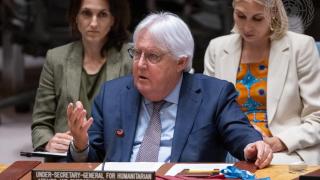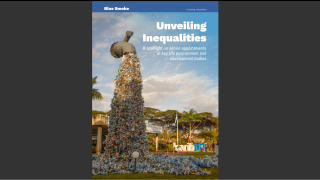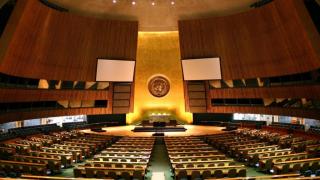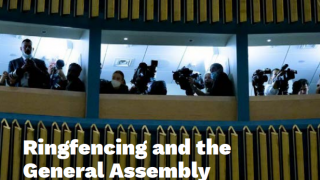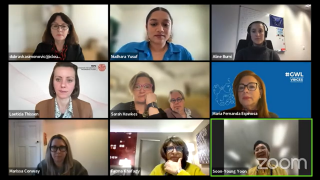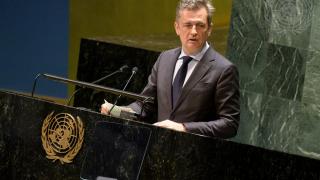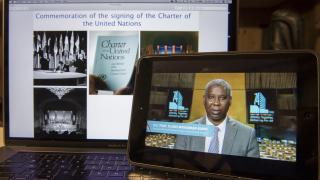
UNA-UK was delighted to hear that states have reached an agreement on a declaration to commemorate the UN’s 75th anniversary. You can find out how the declaration evolved here.
As well as reaffirming political commitment for global cooperation and presenting a shared analysis of the problems our world faces and the solutions to them, this declaration mandates the UN Secretary-General to come up with recommendations for the Organisation and present them to member states by September 2021. We look forward to seeing how this process will unfurl and will be contributing to it in the hope of facilitating the development of a bold package of reforms.
The declaration’s adoption was delayed by one country, presumably by the United States, objecting to language referencing the Paris Climate Agreement - the United States will cease to be a party to the Paris Agreement in November of this year. In a series of letters the President of the General Assembly initially suggested that this objection was merely a technical one, meaning it could not lead to any substantive changes, however they subsequently relented and added new language. It is the adoption of this language that has allowed the declaration to be finalised.
While the President of the General Assembly should be congratulated for bringing negotiations to an end, we are disappointed with the new language. The line:
“We need to immediately curb greenhouse gas emissions and achieve sustainable consumption and production patterns in line with the Paris Agreement and the 2030 Agenda”
was replaced with the line:
“We need to immediately curb greenhouse gas emissions and achieve sustainable consumption and production patterns in line with applicable State commitments to the Paris Agreement and in line with the 2030 agenda”
We are disappointed for a number of reasons. First this is an issue on which there is a clear consensus among 192 of 193 countries in the world. It would therefore be logical to allow the sole objector to lodge a reservation, declaration or statement of interpretation or clarification to the paragraph in question, rather than diminishing the declaration as a whole by pandering to their objections.
Secondly, we are concerned that this focus on the state commitments element of the Paris agreement gives the dangerous and erroneous impression that the Paris Agreement can be reduced to the self-defined commitments of member states. The spirit of the Paris Agreement was that it would provide a platform for far stronger and further reaching action, involving multiple partners – not just the actions of states.
Finally, and perhaps most seriously, this wording could give the erroneous impression that the nations of the world believe current state commitments to the Paris Agreement to be sufficient to curb greenhouse gas emissions. It is universally acknowledged that current state commitments are grossly insufficient to meet even the 2 degree pathway under the Paris Agreement, and that a dramatic increase in level of ambition is required.
We understand that a number of states were unhappy with this new language and will look to put their displeasure on record. UNA-UK hopes that the UK, and indeed all 192 countries who supported the original language of the declaration, join them in doing so. It would be helpful if they could make statements of position demonstrating that they understand that applicable state commitments are entirely insufficient to achieve the aims of the Paris Agreement and committing to increasing ambition and taking the additional action that we so urgently need.
Nevertheless, such semantic issues – while disappointing – should not prevent the declaration from achieving its purpose. UNA-UK would like to thank the co-facilitators Sweden and Qatar for their exemplary work in negotiating this declaration and to the President of the General Assembly for brokering both the compromises required. Furthermore, while the six nations including the UK’s ultimately successful objection to language they perceived as Chinese did add a complicating factor and held the door open for subsequent objections, we understand that British diplomats worked tirelessly and effectively to resolve these issues. We’d like to thank them, and also the Chinese delegation for accepting the removal of the phrase in question.
The next year will now bring with it the exciting opportunity for the bold reform the United Nations needs. Through our Together First campaign, we have championed 10 such ideas. If you support these, or have proposals of your own, why not let the UN know about it by filling in their survey?
Photo: Tijjani Muhammad-Bande, President of the seventy-fourth session of the United Nations General Assembly, addresses the virtual commemoration of the signing of the Charter of the United Nations. Credit:UN Photo/Eskinder Debebe

